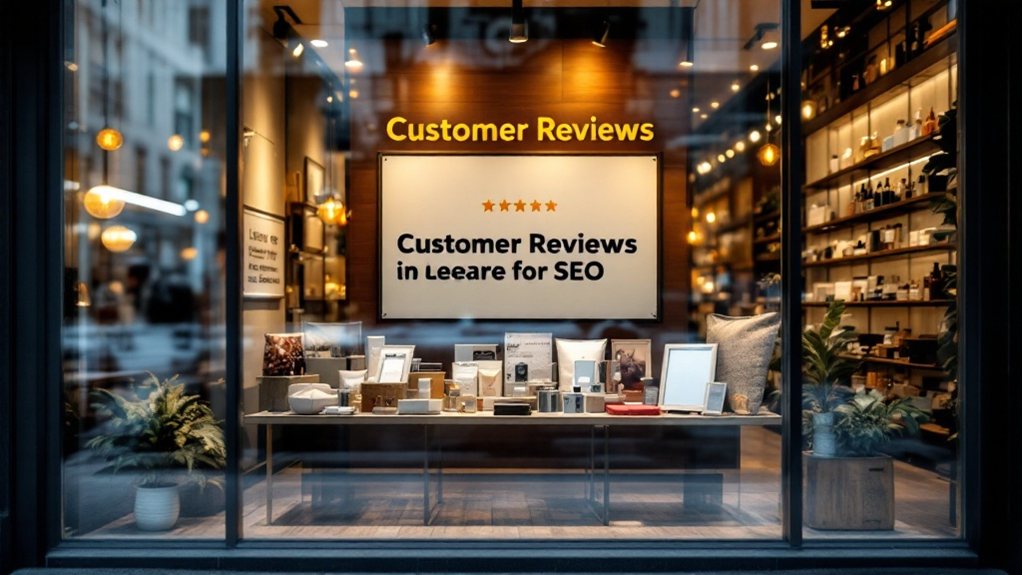As a business, you know that positive, detailed customer reviews can significantly boost your SEO and credibility. To prompt SEO-friendly reviews, streamline the process, personalize requests, and offer incentives. Manage reviews transparently, respond to both positive and negative feedback, and leverage review data to inform your marketing strategies. Integrating reviews throughout your digital presence can provide a competitive edge. To learn more about leveraging reviews for SEO success, continue exploring the strategies outlined.
The Significance of User Reviews for SEO

User reviews hold immense sway when it comes to your SEO efforts. Positive reviews enhance your credibility and trustworthiness, leading to higher search rankings. The diverse, natural keywords in reviews improve your visibility, especially for local SEO. Favorable review snippets also boost click-through rates by acting as social proof. Review signals are important factors in search engine ranking algorithms. Google's algorithm considers review signals like quality and authenticity when determining rankings. Fresh, regularly updated reviews signal your site's relevance, while user interactions like dwell time influence your rankings. Ultimately, proactive review management is crucial for building trust, credibility, and stronger SEO performance.
Strategies to Prompt Customer Reviews

Crafting a strategic review request process is pivotal in garnering valuable customer feedback. Establish detailed guidelines, automate requests, and leverage online booking systems to streamline the process. Tailor requests based on customer satisfaction and ensure review platforms are easily accessible. Simplify the review flow by minimizing steps and offering mobile-friendly options. Personalize requests by addressing customers by name, referencing their purchases, and building rapport through video messages. Incentivize reviews with exclusive offers, contests, and charitable partnerships. Engage with existing reviews by promptly responding, resolving issues, and sharing feedback on social media. Leverage review management software to enhance efficiency and transparency.
Leveraging the Benefits of Review Management

Leveraging the benefits of review management can help your business in several ways. You can maintain a balanced review profile, analyze review data to drive business strategies, and adapt your operations to improve customer satisfaction. Businesses with a positive online reputation get 6.9 times more leads. These practices can boost your online reputation, increase revenue, and set your business up for long-term success.
Balanced Review Profiles
Why is maintaining a balanced review profile so crucial for your business? Mid-range reviews offer a realistic view, proving authenticity and credibility. They provide valuable insights into customer service, helping address specific needs. Balanced Review Profiles leverage the benefits of review management to guide improvements and strategic decisions. Responding to moderate reviews demonstrates your commitment to customer satisfaction, boosting brand reputation and retention. Analyze recurring trends to inform product development. Transparent review management, including organized feedback loops and customer engagement tools, solidifies trust. Curate an authentic mix of review scores to assist potential buyers in assessing product suitability. Effective mid-range review management is essential for sustainable growth and lasting customer relationships.
Leveraging Review Analytics
Harnessing the power of review analytics can provide your business with a competitive edge. By uncovering data-driven insights, you can optimize operations, enhance customer experiences, and manage risks more effectively. Analyze review patterns to identify inefficiencies, then tailor your offerings to meet evolving customer needs. Positive reviews can boost your reputation, attracting more customers, while addressing common complaints mitigates potential risks. Leverage review data to develop targeted marketing strategies and uncover untapped opportunities, streamlining your business. Optimized marketing campaigns can allocate resources to the most effective channels and determine the highest-performing ad campaigns based on ROI. Utilize AI-powered tools to automate review analysis, freeing up time for more strategic initiatives. Integrate review data with your CRM to holistically manage customer relationships. Review analytics is a powerful ally in driving sustainable business growth.
Adapting Business Strategies
By harnessing the benefits of review management, you can adapt your business strategies to drive sustainable growth. Review management allows you to enhance your brand reputation, improve customer perception, and boost your search engine optimization. Review management is a key part of the larger framework of reputation management, which considers a company's complete image and public perception. Effective review responses showcase your commitment to customer satisfaction, giving you a competitive edge. Additionally, review data can guide product/service refinements, marketing strategies, and operational adjustments to better meet customer needs. Automating review management frees up resources, enabling you to focus on high-value initiatives. Ultimately, leveraging reviews empowers you to build trust, attract new customers, and accelerate your business growth.
The Impact of Reviews on Search Rankings
Reviews have a significant impact on your search rankings. The quantity and quality of reviews matter, as they influence your credibility, relevance, and visibility in both branded and unbranded searches. Positive reviews enhance click-through rates for branded searches. Effectively managing your review profile can provide a competitive advantage and contribute to the long-term success of your business.
Quality and Quantity
The quality of your reviews can have a significant impact on your search engine optimization (SEO) efforts. High-quality, credible reviews enhance your business's trustworthiness, which search engines value. These reviews often contain relevant keywords, improving your local search visibility. Positive reviews also serve as social proof, building trust and boosting your reputation. Moreover, detailed and keyword-rich reviews can directly improve your SEO performance. Responding to reviews demonstrates your customer satisfaction and engagement, further enhancing your SEO. The quantity of reviews also matters, as more reviews typically increase your local search visibility and signal your business's popularity and customer interaction. Review signals contribute approximately 15.44% to Google's local algorithm, which underscores the importance of encouraging customers to leave SEO-friendly reviews.
Algorithm Considerations
One of the key factors that algorithms consider when determining local search rankings is the impact of reviews. Reviews contribute around 15.44% to how Google ranks local businesses. A 5-star rating can boost clicks from the Google Local Pack by 25%, as positive reviews enhance business credibility and trust, improving local search visibility. Businesses with 200+ reviews experience over 100% increase in revenue compared to those with fewer reviews. Google prioritizes reputable businesses that maintain active status and high service quality perception, which regular, recent reviews can demonstrate. Bad reviews can negatively impact local search rankings by reducing consumer trust and perception of business quality.
Competitive Advantages
Positive reviews can provide your business with a considerable competitive advantage in the digital landscape. High-quality reviews significantly influence consumer decisions, with 85% of customers trusting them as much as personal recommendations. Additionally, positive reviews can enhance your local visibility on search engines and drive higher click-through rates, leading to improved search rankings. Online reviews are crucial for improving local SEO. Importantly, a one-star improvement in ratings can increase your revenue by 5-9%, highlighting the financial benefits of stellar reviews. By building trust and credibility, positive reviews can help you outshine competitors, secure better search positions, and foster customer loyalty – all crucial factors for success in today's digital marketplace.
Addressing Negative Reviews Effectively
Effectively addressing negative reviews is crucial for maintaining a positive brand reputation and fostering customer trust. Respond promptly within 24-48 hours, keeping a professional tone to showcase your commitment to customer care. Acknowledge the specific issue and invite customers to contact you privately for resolution. Analyze reviews to identify patterns, then use the feedback constructively by making improvements and communicating them. Show empathy, avoid defensiveness, and personalize your responses. Manage the conversation effectively by moving complex discussions offline and offering concrete solutions. When done right, you can transform negative experiences into positive outcomes, changing the narrative and demonstrating your ongoing commitment to customer satisfaction.
Optimizing Review Visibility and Structured Data
Optimizing review visibility starts with leveraging schema markup to make them more prominent in search results. You can further boost their impact by strategically placing customer reviews on your website. Leveraging structured data like JSON-LD or Microdata ensures your review content is properly integrated across platforms.
Schema Markup Optimization
While schema markup provides a powerful tool for enhancing the visibility and credibility of customer reviews, optimizing its implementation is crucial. Ensure you use the most relevant review schemas, such as Review and AggregateRating, to structure your data accurately. Regularly validate your markup using tools like Google's Rich Results Test to detect and fix any errors. Keep a close eye on schema.org updates and adjust your markup accordingly. Furthermore, don't neglect mobile optimization, as it's essential for maintaining visibility across devices. By diligently managing your schema implementation, you can unlock the full potential of structured data, boosting your reviews' impact and your brand's online credibility.
Prominent Review Placement
Prominently displaying customer reviews is a strategic move that can significantly impact your brand's online presence and credibility. By showcasing reviews in high-visibility locations, such as your homepage and product pages, you'll maximize their reach and influence. Integrating reviews into relevant business sections, like "About Us," can further build trust. Positioning reviews near critical calls-to-action can enhance conversion rates by reinforcing customer confidence at key decision points. Leverage segmented display to showcase reviews tailored to specific products or services, improving relevance. Structured data integration, dynamic review widgets, and visually appealing elements will enhance the user experience and increase engagement.
Integrating Reviews Into Marketing Efforts
Integrating customer reviews into your marketing efforts can significantly strengthen your brand's credibility and influence purchasing decisions. Showcasing positive reviews across your marketing materials, from email campaigns to social media, adds a personal touch and amplifies your brand's reach. Respond to both positive and negative reviews to foster loyalty and demonstrate your commitment to customer satisfaction. Leverage reviews in case studies and testimonials to showcase product success stories and highlight customer preferences. By strategically weaving reviews into your marketing strategy, you can effectively enhance your brand's perceived value and drive increased sales and conversions.
Review Management Platforms and Tools
Review management platforms offer a comprehensive solution for businesses to streamline and optimize their online review processes. These platforms centralize reviews from various sites, enhancing your business's exposure. They allow you to personalize review requests and responses, leveraging AI-driven tools for automation. Scalable for small to large enterprises, these platforms facilitate multi-channel review requests, automated campaigns, and real-time notifications. Integrating with your CRM, e-commerce, and social media, they provide API access for customized integrations. Robust analytics dashboards offer sentiment analysis, performance benchmarking, and customer feedback visualization. With flexible pricing and scalability options, review management platforms empower you to encourage SEO-friendly reviews effectively.
Maintaining a Continuous Feedback Loop
Establishing a continuous feedback loop is crucial for understanding your customers' evolving needs and preferences. By implementing structured methods like surveys and leveraging customer success tools, you can gather valuable insights to drive ongoing improvements. Analyze the feedback to identify trends and recurring issues, then swiftly implement changes to enhance the customer experience. Notify your customers about the actions taken in response to their input, demonstrating your commitment to their satisfaction. Continuously refine the feedback loop to maintain high levels of customer loyalty and retention. Effective implementation of this process will contribute to your profitability and position your business as customer-centric.
Measuring the Success of Review Optimization
To gauge the effectiveness of your review optimization efforts, you'll need to track a range of quantitative and qualitative metrics. Monitor review count, average rating, and positive vs. negative sentiment. Analyze review content to understand customer perceptions. Evaluate review distribution, length, and detail to assess engagement. Analyze trends over time to identify improvements or declines. Align your review strategies with business goals, measuring financial impact and reputation management. Leverage advanced analytics tools, including AI, to predict and analyze review patterns. Assess customer satisfaction and loyalty through metrics like NPS. Continuously review performance and adapt your approach to industry trends.
